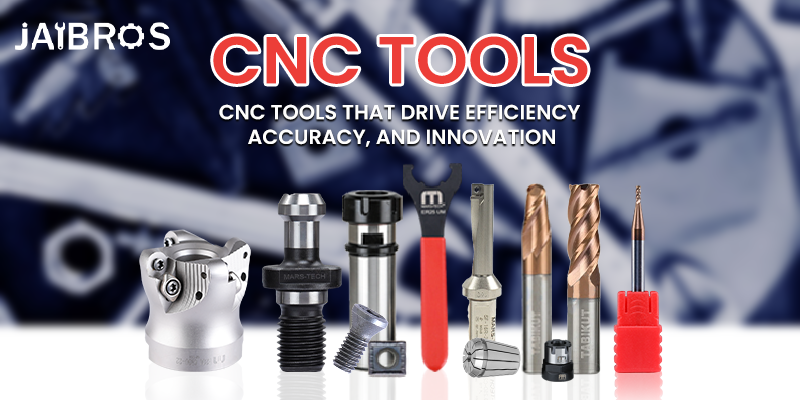Durable CNC Tools Engineered for Heavy-Duty Operations

Durable CNC Tools for Heavy-Duty Industrial Machining
In contemporary manufacturing, durability and precision are vital. Industries that work with metals, alloys, composites, or high-hardness materials utilize advanced tooling to maintain performance in extreme conditions, and CNC tools play a key role. If these tools are constructed to withstand tough applications while getting the job done efficiently, accurately, and repeatably for long production runs, then the possibilities are endless.
For workshops taking on complex workpieces in demanding applications such as aerospace components, automotive parts, industrial dies, and large-scale fabrication, the selection of tooling construction may change the experience altogether for effectiveness and operational cost. Heavy-duty machining is not just removing the material; it is also the experience of material being removed with stability, speed, and no requirement to replace tooling. This blog will go over what makes tooling more durable, what technologies support the construct of durability or consistent performance, and how a business can make better choices for better sustained productivity.
Why Heavy-Duty Machining Demands Stronger Tooling
Heavy-duty machining involves cutting through tough materials such as stainless steel, cast iron, titanium, and hardened alloys. Standard tools can easily chip, overheat, or dull in these conditions. That’s why industries depend on engineered tools built with optimized geometry, strong substrates, and robust coatings.
The right set of CNC tools ensures reliable machining without frequent replacements or downtime. When tools are engineered specifically for heavy loads, they maintain consistent cutting pressure, dissipate heat effectively, and deliver stable performance even during continuous multi-shift operations.
Materials and Coatings That Improve Tool Durability
The durability of a tool starts with its construction. Modern tools are often made using:
1. Carbide Substrates
Carbide is known for high hardness, excellent wear resistance, and outstanding heat tolerance. This makes it ideal for aggressive machining operations.
2. Coated Surfaces
Advanced coatings add an extra layer of protection. Some popular coatings include:
-
TiAlN (Titanium Aluminum Nitride)
-
AlCrN (Aluminum Chromium Nitride)
-
Diamond coatings for composites
-
TiCN (Titanium Carbonitride)
These coatings reduce friction, increase surface hardness, and improve tool life—especially under dry or high-speed cutting conditions.
When combining strong substrate material with advanced coatings, manufacturers create tools capable of outperforming traditional cutters in harsh environments.
Key Features of Heavy-Duty CNC Tools
To excel in tough machining conditions, tools must incorporate engineering features such as:
1. Reinforced Cutting Edges
These edges resist chipping when cutting hardened or abrasive materials.
2. Optimized Flute Designs
Flutes help maintain chip evacuation, preventing heat buildup and tool breakage.
3. Vibration-Resistant Geometry
Machining heavy materials often introduces chatter. Well-designed geometries ensure smoother, more controlled cutting.
4. High Thermal Stability
Durable CNC machine tools rely heavily on their ability to withstand high temperatures generated during continuous operations.
5. Stability at Higher Feed Rates
Heavy-duty machining demands productivity. Tools built for these conditions maintain accuracy even when operating at aggressive speeds.
Applications Where Heavy-Duty CNC Tools Outperform Standard Tools
Durable cutters are essential in industries where every cut affects performance, safety, and reliability. Some key applications include:
-
Aerospace component manufacturing
-
Automotive engine and drivetrain parts
-
Die and mold industries
-
Oil and gas machinery
-
Industrial fabrication and metalworking units
These sectors often use large amounts of CNC machine tools, especially for milling, drilling, and shaping high-strength materials. Reliable tools reduce cycle times, improve surface finishes, and help manufacturers maintain consistent production quality.
How to Choose Tooling for Heavy-Duty Operations
Selecting the right tools goes beyond simply purchasing carbide tools. Consider the following factors:
1. Material Compatibility
Not all tools work well with all materials. Hard alloys require tools designed with specific cutting-edge profiles.
2. Tool Coating Requirements
High-speed or high-heat machining benefits from advanced coatings that extend tool life.
3. Machine Rigidity and Power
Even durable CNC tools perform best when paired with a stable and powerful machine.
4. Operation Type
Whether milling, drilling, roughing, or finishing—tools must match the exact machining goal.
5. Supplier Reliability
Purchasing tools from a trusted CNC tools manufacturer ensures consistent quality and support. Reliability becomes even more important when performing heavy-duty machining, where precision and durability matter most.
Buying Durable CNC Tools in India
Indian industries continue to expand rapidly, increasing the demand for reliable tooling. Many professionals prefer buying from a tools online shop in India because these platforms offer:
-
Wide product ranges
-
Easy comparison
-
Fast delivery
-
Access to local and global brands
When dealing with advanced or heavy-duty applications, working with a dependable cnc tools manufacturer and a reputable online supplier can make a significant difference in performance and long-term cost savings.
Conclusion
Durability is not just a bonus in the machining process; it is a must-have. If you are a tool for heavy-duty work, you must withstand vigorous forces and high speeds while working difficult materials and maintain the utmost level of precision. With the right CNC tools in place, industries can count on maintained performances, extended tool life, and cleaner requirements while working in extremely tough conditions.
When many skilled tradespeople consider which tools and tooling to buy, many will go with the established suppliers—often one from their own country—in order to have access to what is thought of as a reliable source of high-quality options. Companies such as Jaibros are recognized as one of the more familiar brands in the eyes of an experienced machinist and service suppliers of quality and good industrial training, service, and commercial solutions for workshops and machinist operations to help maximize production with no negative downtimes or at least less than expected results when that remains first.
Whether it’s a workshop or an industry in question, the first consideration will at least be some form of durable and reliable tooling built to last to get through an extended long run of machining.
FAQs
1. What makes CNC tools suitable for heavy-duty operations?
CNC tools built for heavy-duty use are made with strong carbide substrates, advanced coatings, and vibration-resistant geometry. These features help them withstand high heat, tough materials, and long machining cycles without losing accuracy.
2. Where can I buy durable CNC tools in India?
You can explore various options on a CNC tools online shop India, where you’ll find milling cutters, drills, inserts, and other essential tools suitable for industrial applications.
3. Why are coated CNC tools better for tough materials?
Coatings like TiAlN and AlCrN improve heat resistance, reduce friction, and increase tool life. This makes coated tools ideal for machining stainless steel, cast iron, titanium, and hardened alloys.
4. Should I buy from a certified CNC tools manufacturer?
Yes. A certified cnc tools manufacturer ensures consistent quality, proper heat treatment, accurate dimensions, and advanced geometries designed for long-term durability.
5. How do CNC machine tools improve machining quality?
CNC machine tools offer precision, stability, and repeatability. When combined with high-quality cutters, they deliver smoother finishes, lower tool wear, and shorter machining times.






